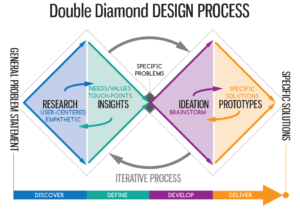Date/Time
Date(s) - 04/05/2021
10:00 - 12:30
Instructor
Costas Papadopoulos and Susan Schreibman
Categories
Organizers: Costas Papadopoulos & Susan Schreibman
Costas Papadopoulos is an Assistant Professor in Digital Humanities and Culture Studies and Susan Schreibman is Professor of Digital Arts and Culture at the Faculty of Arts and Social Sciences, Maastricht University. Both work in the area of digital humanities and digital cultural heritage, remediating physical objects (from historical documents to archaeological artefacts) into digital formats. They have managed many projects in which design thinking approaches have contributed to the project’s successful completion. They are the co-developers of #dariahTeach, an online platform for teaching Digital Humanities. As part of this platform, they are currently developing a course on ‘Design Thinking and Making for the Arts and Sciences’ (https://ignite.acdh.oeaw.ac.at/) that will be made publicly available in Spring 2020.
Workshop description:
Design thinking is many things to many disciplines. It is a method, a process, and a way of thinking. Above all, it is a user-centred approach to design. Designing what, you might ask? Well almost anything, from software to buildings, to exhibitions. It is used in a wide variety of disciplines, from engineering to business to heritage studies. It embraces an iterative rather than a linear approach to project management, does not shy away from missteps or failures, and encourages prototyping and testing.
A design thinking approach encourages creative and practical problem solving and making sure the problem being solved is appropriate for the community for which it is being designed. And while this sounds intuitive, it isn’t always. How many times have you heard of a product being created for a demographic that does not have a need for it, or a bridge in a city centre designed for vehicular traffic, but nobody thought that pedestrians and bicyclists would also want to use it, or software that is so anti-intuitive that it’s impossible for its users to understand it without significant documentation/training.
Design thinking is a practice that helps you not to make these mistakes (although you may make others!). It can be used for any type of problem to be solved: from group projects to your thesis. In this two hour workshop we will introduce you to the principles of design thinking: how to define the problem, explore solutions to solve it, prototype to test your ideas, and then evaluate what you have created. You will work in teams on an exercise encompassing these principles to get hands-on design thinking experience.
What are the methodology and/or methods that the workshop will cover?
Due to the current restrictions in face to face teaching the workshop will be conducted via Zoom. Registered participants will be sent a link to join the Zoom room closer to the time. We will introduce a number of design thinking methods and approaches, utilising what is known as the ‘double diamond’ approach to problem solving, which represents the design process through four stages: Discover – Define – Develop – Deliver. Using a hands-on approach, breakout rooms, and interactive exercises, students will employ creative design methods to respond to challenges, and develop creative solutions.

To participate in this workshop, you will need to prepare the following material(s):
What is Human-centred Design
https://vimeo.com/106505300
FHIL | Stages of Design Thinking | All stages https://www.youtube.com/watch?v=GFffb2H-gK0
An Introduction to design Thinking: Process Guide
https://dschool-old.stanford.edu/sandbox/groups/designresources/wiki/36873/attachments/74b3d/ModeGuideBOOTCAMP2010L.pdf
At the end of this workshop, you will have obtained the following skills:
- Understand the importance of design thinking principles in responding to challenges;
- Develop design-thinking skill sets and know how to apply these to different projects;
- Being comfortable with structuring and performing workflows for conceptualising, prototyping, and realising solutions and/or products using a variety of tools and methods;
- Comprehend the principles of the Double Diamond design process and apply creative methods to go through the four stages of the process;
- Master ideation processes;
- Apply user-centred design methods as a way of responding to user insights;
- Create visual frameworks to represent findings;
- Practice Rapid Prototyping using e.g. mockups, prototypes, roleplay etc.;
- Develop strategies for strategic flexibility, working collaboratively, and thinking creatively;
How will the workshop be offered?
Zoom and the function of breakout rooms, the session will last 2,5 hours.
Booking is available below from 29 April at 8:00.
Bookings
This event is fully booked.